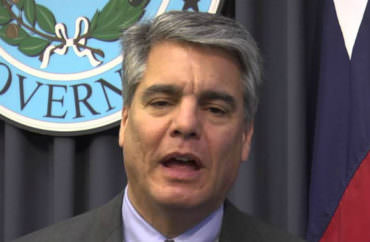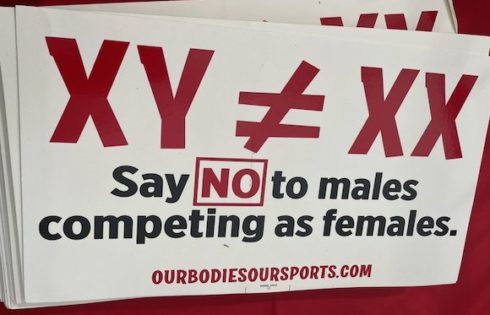
UPDATED
President later releases content-neutral basis for punishment
The University of Texas-Austin is looking for the “perpetrators” behind an online incident, but its grounds for investigation may undermine its First Amendment obligations.
On Monday, President Greg Fenves promised to punish any “members of the UT community” found responsible for the “racist” and “reprehensible” intrusion into a Zoom meeting held by a research group for black men.
A spokesperson for the university insists the grounds for investigation are content-neutral, despite the clear message from Fenves (above) that the “Zoom bombing” was “reprehensible” because it was “racist,” not because it violated UT policy on disruptions.
The president’s Wednesday message to the community reiterated the offensiveness of the Zoom bombing, even as Fenves specified that anyone who “disrupts or interferes with university classes or meetings will face discipline.”
Zoom bombing, made possible by the screen-sharing features in the remote conferencing platform, has drawn concern in recent days as colleges and universities suddenly shift their classes online in response to the coronavirus pandemic.
An Arizona State University professor said his 150-student class was disrupted by users who showed a sexually explicit video and posted “vulgar, racist, misogynistic toilet humor,” according to Inside Higher Ed.
UCLA suffered a similar incident as did UT, according to the Daily Bruin. “About five minutes into the lecture” by research astronomer R. Michael Rich, who is white, a user started calling him the “N-word,” according to student Jessica Jackson.
The UT incident does not appear to have been a “hacking” but rather a result of the group publicly sharing a link to an open meeting.
While UT can punish such behavior, “it needs to be punished the same way UT punishes any other sort of heckling,” UCLA law professor Eugene Volokh, a First Amendment expert, told The College Fix in an email.
If the university has “tolerated heckling, at least brief heckling, in some situations, then it couldn’t punish particular heckling because of the viewpoint it expresses,” he said.
MORE: UT dean says phrase ‘Chinese virus’ endangers Asian American students
We are investigating the racist Zoom bombing of a meeting of UT students, staff & faculty. It was reprehensible. If the perpetrators are members of the UT community, they will be disciplined. We will also increase online security for all UT staff to prevent similar incidents.
— Greg Fenves (@gregfenves) March 31, 2020
‘Any discipline under university rules, if applied, would be to prevent disruption’
UT’s Heman Sweatt Center for Black Males, which suffered the Zoom bombing, consists of “professors, administrators, graduate, and undergraduate students.”
Unlike Fenves, the center did not mention the racial content of the intrusion in a Twitter thread Monday. It simply condemned the “hackers” who crashed its meeting, even though the center had tweeted the link to the supposedly private meeting.
The center (below) is “working to better our newly found space on Zoom,” it continued: “We will be sending links for virtual meetings through emails and GroupMe from now on.”
A self-identified representative of the center apologized on Twitter for the incident: “being called racial slurs is so unacceptable and I know things like this can truly hurt and be upsetting.” He questioned whether the Zoom bombers were fellow students.
Fenves’s tweet to the community Monday didn’t imply that crashing a Zoom meeting violated a content-neutral university policy or law. The president simply said UT was “investigating the racist Zoom bombing of a meeting of UT students, staff & faculty. It was reprehensible.”
He also promised to “increase online security for all UT staff to prevent similar incidents,” even though the root of the incident appears to be the center’s public posting of an open meeting link.
“We had security measures for Zoom in place for faculty, many of whom are using it for online classes,” J.B. Bird, director of media relations & issues management, wrote in an email Tuesday to The Fix:
As of today, we are implementing those same measures for staff, to prevent the kinds of vulnerabilities that the investigation is exploring related to yesterday’s incident. Any discipline under university rules, if applied, would be to prevent disruption of a meeting or classroom, so the university can maintain order. The zoom meeting was a closed meeting, not an open public forum.
MORE: University of California can’t legally ban phrase ‘Chinese virus’

President equates offensiveness with ‘harassment’
Bird told The Fix that the university was not saying it would take legal action in response to the Zoom bombing, but he deflected questions about Fenves implying that students could be punished for their speech.
“Our university handbook spells out rules about disrupting university classes or meetings,” he said, citing a section on speech, expression and assembly that bans disruption of or interference with “teaching, research, administration, function of the University, or other authorized activities on the campus.”
Pressed to explain how Fenves’s tweet, which focused on the racism of the intrusion, did not signal an intent to punish students for their speech, Bird forwarded The Fix an email to the community Wednesday.
In the message, Fenves doubles down on the offensiveness of the intrusion’s content. “Although UT classes are now online, our values and commitment to one another are the same as ever,” he wrote:
Unfortunately, there has been some reprehensible behavior, including racist actions, that has taken place in our new campus setting. There will be no tolerance for harassment and bigotry in our classrooms — online or otherwise.
This is the first point at which Fenves mentions a campus policy violation, harassment. But by also mentioning “bigotry,” he again implies that speech or viewpoint can be punishable at UT.
The message then pivots back to content-neutral language: “And any member of the UT community who disrupts or interferes with university classes or meetings will face discipline.”
UPDATED: The Fix quickly removed an interview with Eugene Volokh, the law professor, after this article was published due to a misunderstanding of his argument. It has added a subsequent interview with Volokh that attributes his argument correctly.
MORE: UC system tells students and faculty not to use term ‘Chinese virus’
MORE: Dean shames professor for quoting Supreme Court decision with n-word
IMAGES: Governor Perry/YouTube, Heman Sweatt Center
Like The College Fix on Facebook / Follow us on Twitter





Please join the conversation about our stories on Facebook, Twitter, Instagram, Reddit, MeWe, Rumble, Gab, Minds and Gettr.